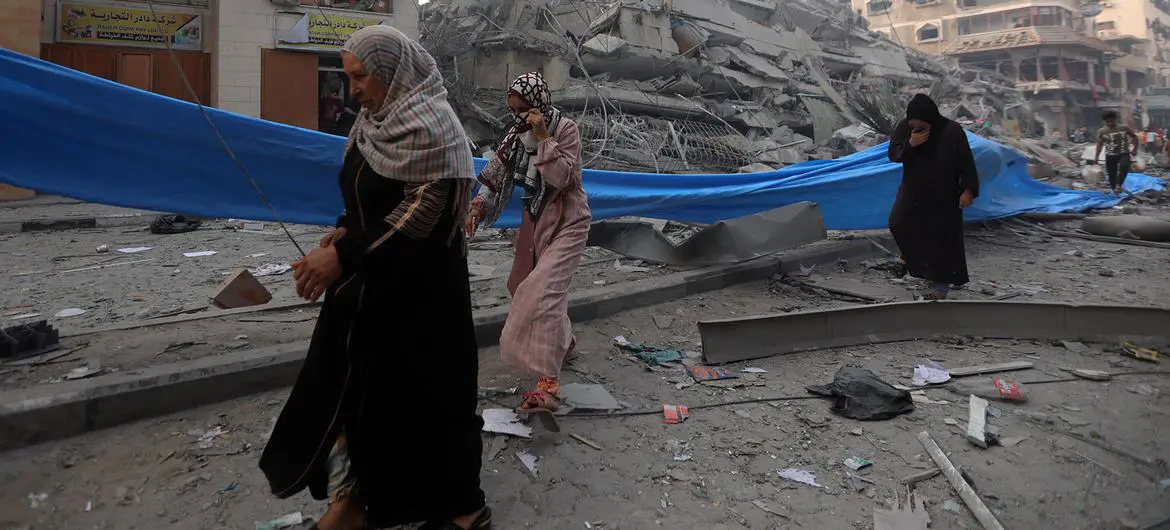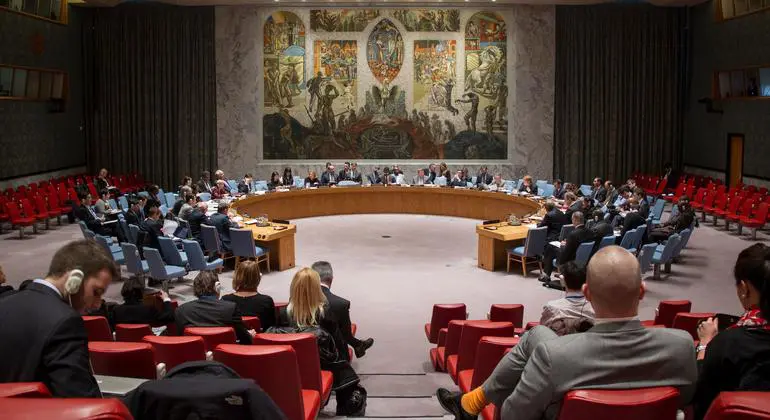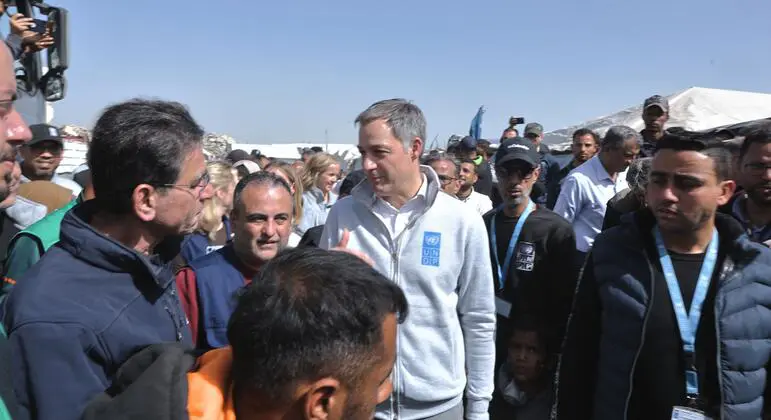According to media reports, ongoing negotiations over the Israel-Hamas agreement on a four-day humanitarian pause and the freeing of hostages held by the Palestinian armed group since its 7 October terror attacks indicated that the deal’s entry into force was believed to be unlikely before Friday.
Amid rising hunger, UN World Food Programme (WFP) chief Cindy McCain said that the agency was “rapidly mobilizing to scale up assistance inside Gaza” once safe access is granted. Her comments followed UN emergency relief chief Martin Griffiths’ statement on the Organisation’s readiness to increase the volume of aid brought into the enclave and distributed across the Strip.
Ms. McCain said that WFP trucks are “waiting at the Rafah crossing, loaded with food slated for families in shelters and homes across Gaza, and wheat flour for bakeries to resume operations”.
Latest UN humanitarian reports indicated that wheat flour is no longer available in markets in the north of Gaza and that no bakeries are functioning owing to a lack of fuel, water, flour and structural damage.
Hopes for a lifeline
Since limited aid deliveries through the Rafah crossing with Egypt resumed on 21 October, just over 73 truckloads of WFP food aid have made it into Gaza, falling far short of needs.
Ms. McCain expressed hope that more fuel will be let into the enclave “so that our trucks can carry in much-needed supplies and that once again bread will be available as a lifeline to hundreds of thousands of people every day”.
Some 75,000 litres of fuel entered Gaza from Egypt on Wednesday following an Israeli decision last week to allow the “daily entry of small amounts of fuel for essential humanitarian operations”, according to UN humanitarian affairs coordination office OCHA.
The fuel is being distributed by the UN agency for Palestine refugees, UNRWA, to support food distribution and the operation of generators at hospitals, water and sanitation facilities, shelters, and other critical services in the south of the Strip, as access to the north has been cut off by Israeli military operations.
OCHA head and UN emergency relief chief Martin Griffiths said last week that some 200,000 litres of fuel per day were needed.
Hospital evacuation update
A new evacuation of 190 wounded and sick people, their companions and medical workers from Al-Shifa hospital in Gaza City was completed on Wednesday.
The development was announced by UN health agency WHO as a joint effort between UN agencies and humanitarian partners led by the Palestine Red Crescent Society (PRCS).
The evacuees were transported in an ambulance convoy to the south.
OCHA quoted PRCS reports stating that the evacuation “lasted for almost 20 hours as the convoy was obstructed and subjected to inspection while passing through the checkpoint that separates northern and southern Gaza” and deploring the fact that the lives of patients had been endangered.
Evacuated dialysis patients were transferred to Abu Youssef An Najjar Hospital in Rafah, Gaza, while other patients were transported to the Strip’s European hospital in Khan Younis. An estimated 250 patients and staff are believed to be at Al-Shifa, which is no longer operational, OCHA said.
Meanwhile, Wednesday saw the lowest number yet of displaced people leaving northern Gaza to cross to the south using the “corridor” opened by the Israeli Defense Forces along the Strip’s main traffic artery, Salah Ad Deen Road.
According to OCHA monitoring only some 250 people moved south. The UN Office said that the decline is “largely attributed to the expectations generated by the humanitarian pause” which is yet to be implemented.
To date, over 1.7 million people in Gaza are internally displaced.
Life inside Gaza
Meanwhile, an UNRWA staff member who fled Gaza this week spoke to UN News about living and working during the conflict.
Maha Hijazi, UNRWA’s Warehousing and Distribution Officer, was responsible for securing food for hundreds of thousands of displaced people (IDPs) now sheltering in its facilities.
“Our plan…was to have 150,000 Palestinians IDPs inside UNRWA shelters which are now reaching about one million,” she said.
The UN and partners continue to appeal for more aid to be allowed into the Gaza Strip, which continues to face dire shortages of food, water, fuel, medicines and other desperately needed items.
Full shelters, empty markets
Most UNRWA staff are themselves Palestine refugees and some have also sought refuge in its shelters while continuing their lifesaving work. More than 100 of their colleagues have been killed to date.
Although Ms. Hijazi’s family were not staying in one of the shelters, she said her parents barely found food in the markets.
“We went to the markets, but it’s empty. We found nothing to purchase. We have money, but we have nothing to purchase,” she said.
A mother’s decision
On Monday, Ms. Hijazi and her family fled Gaza for Egypt. She was angry and reluctant to leave her homeland, apartment and job.
“Neither my kids, nor any of our Palestinian kids feel safe, feel secure, and feel protected. The whole night and day they hear bombing everywhere,” she said.
Ms. Hijazi recalled that before going to bed, her children would ask her if they were going to die like their neighbours and relatives.
“I had to hug them and promise them that if we die, we will die altogether, so we won’t feel anything. And if you hear the bombing, then you are safe. The rocket that will kill you, you will not hear its sound,” she said.
Despite the pain of leaving of Gaza for Egypt, Ms. Hijazi felt this was the best decision for her children, who are dual nationals.
“I need to get this chance for them to sleep and to feel that they are similar to other kids,” she said.
“I can tell you that the whole trip I was crying with my kids because we don’t want to leave our land, we don’t want to leave Gaza. But we are forced to do that seeking safety and protection.”







